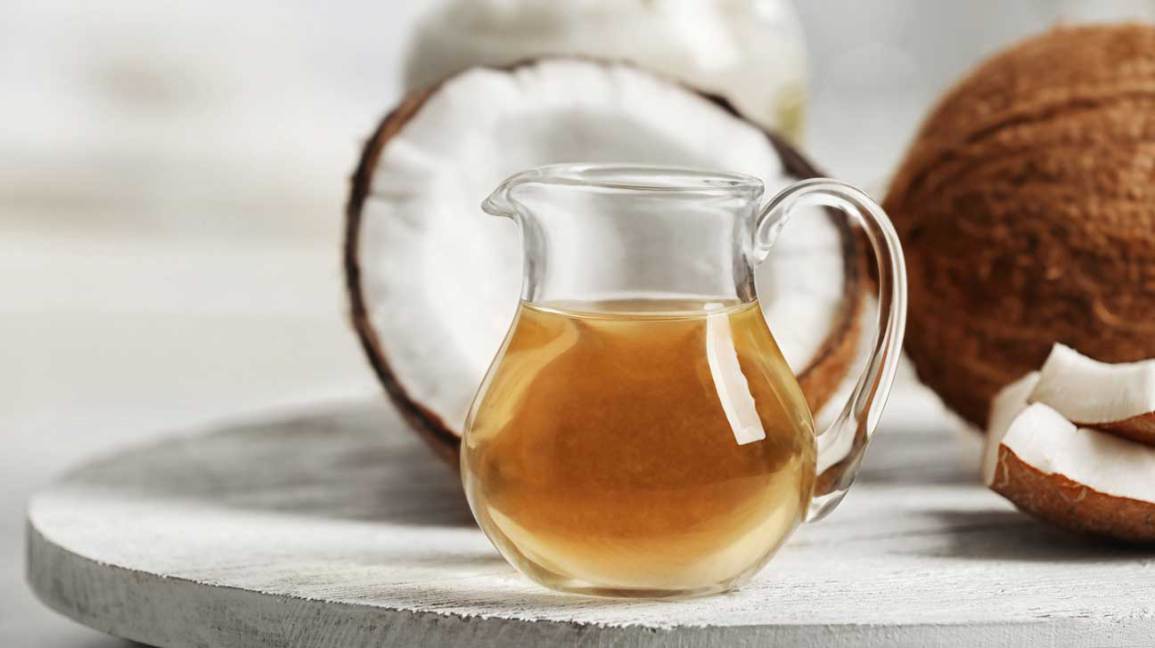Medium chain triglycerides (MCTs) are triglycerides with two or three fatty acids, having tails that are 6-12 carbons in length (1).
Natural sources include coconut oil, palm kernel oil and dairy fat (2).
MCTs are easily digested and absorbed, due to their shorter length, and as such can initiate whole body healing effects. MCTs have been considered safe for human consumption by the FDA for over 20 years (3).
Best MCT Oil
1. Nuzena MCT Pure+
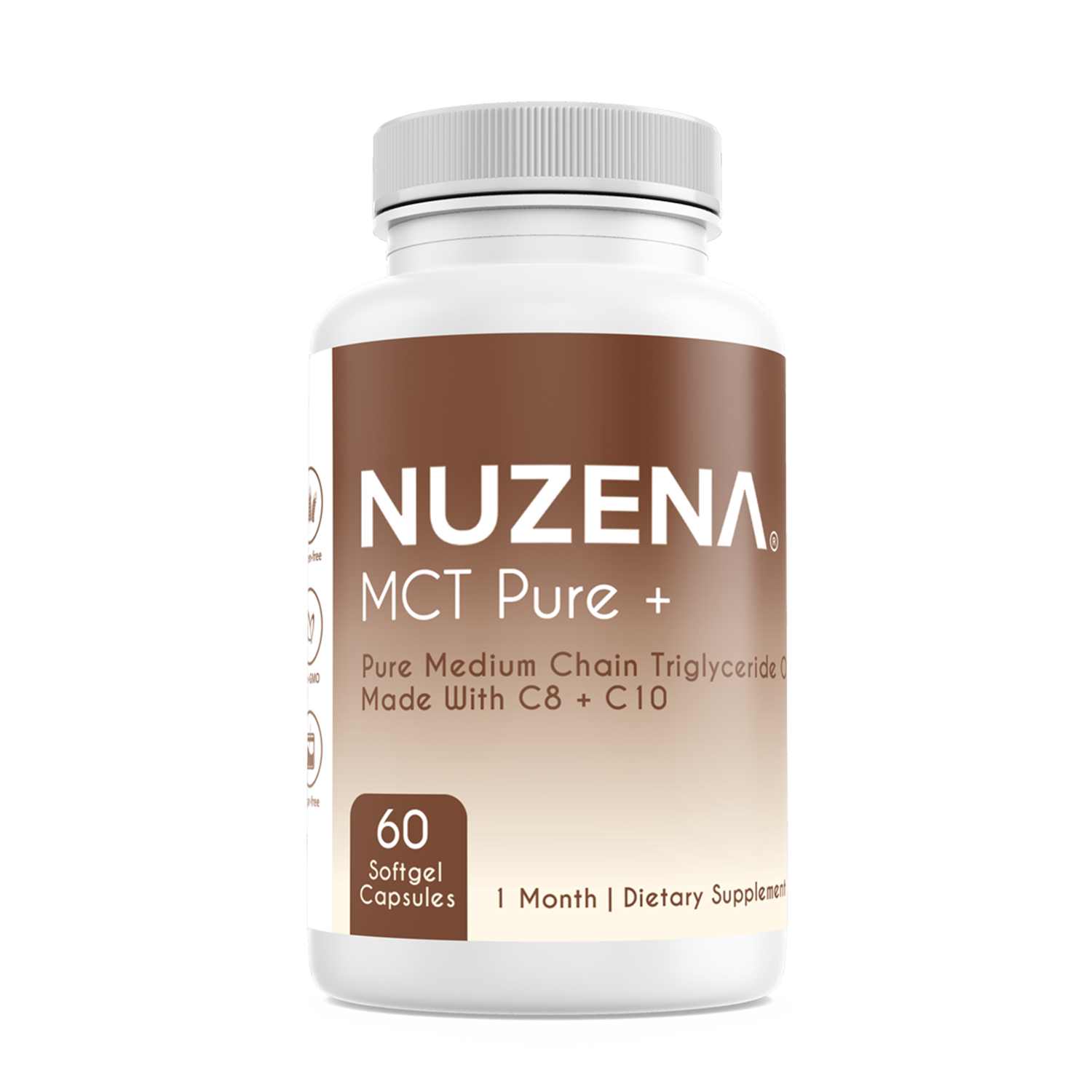
MCT Pure+ by Nuzena is one of the best medium-chain triglyceride (MCT) supplements on the market. Each capsule provides a mix of MCT’s caprylic acid (C8), and capric acid (C10), which have several gut-health and bioavailability benefits.
Nuzena’s MCT formula is non-GMO, gluten-free, and vegan friendly, and Nuzena has an impressive reputation for great customer service. Their products are quality certified, with real-time ingredient reports, and they also provide access to registered dieticians available right through their website – a big bonus in our eyes. Healthtrends #1 pick, by far.
2. Team Keto PURE C8 MCT Oil Powder

This pure C8 MCT Oil Powder is formulated to contain pure caprylic acid only in order to aid your ketone level in rising quickly and efficiently. The formula is easy to use and is very gentle with no nasty side effects or after tastes that won’t go away.
The serving size is small and it tastes great so you will totally enjoy this MCT oil by itself or mixed however you typically make your MCT oil. This powder is a great ketosis activation tool, especially if you’re struggling to get started or to maintain your ketosis.
3. Viva Naturals MCT Oil
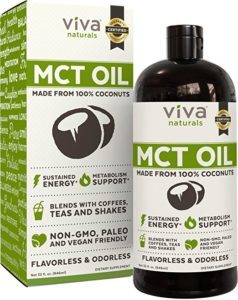
Viva Naturals is a third party certified MCT oil optimally designed to boost weight loss through low carb dieting. A serving size of this oil only requires about a tablespoon for optimal results. This MCT oil compound has no flavor, no odor and is USDA-certified organic.
You can use this MCT oil in multiple ways from coffees and shakes to even salads. MCT oil is very popular for the keto diet, but this oil is also a great option for paleo, vegan, and just low-carb lifestyles.
4. Sports Research MCT Oil
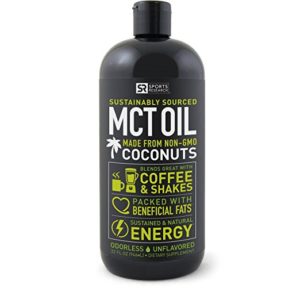
Sports Research MCT Oil is designed to fuel your brain and your body without the additives and sugars that so many of those have. This MCT oil is perfect to mix with coffees and shakes.
It’s non-GMO, dairy-free, gluten-free, vegan-friendly, and keto-friendly. You can expect to find loads of C8, C10, and C12. You can also purchase your MCT oil in travel packs, 16 oz., 32 oz., or 128 oz. This MCT oil is keto and vegan certified.
5. Bulletproof Brain Octane MCT Oil
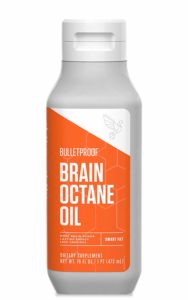
This MCT oil from Bulletproof is rightfully named Brain Octane oil because it instantly boosts your brain providing mental focus and energy and helping your body maintain ketosis or get into ketosis.
Bulletproof strives to offer the purest ingredients and this MCT oil goes through a triple distillation process using only pressure, heat, and water. There are no chemicals or solvents to be concerned about in this formula.
6. Nature’s Way Organic MCT Oil
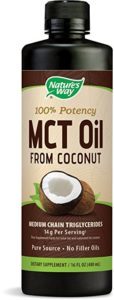
Nature’s Way MCT oil is a 100% potent compound that is keto-friendly as well as being certified paleo and vegan. Additionally, this formula gluten-free and non-GMO.
There are no fillers in this MCT oil, it is wholly pure and contains 14 grams of MCT per serving. Fuel your brain and body with this pure and potent formula that is very affordable.
7. Garden of Life Organic Coconut MCT Oil
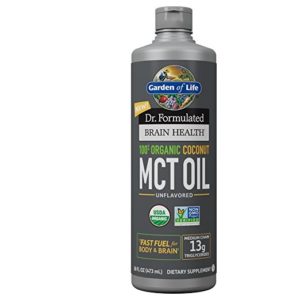
The Garden of Life MCT oil is formulated by doctors who know and understand just what your body needs for optimal health. This 100% organic blend of MCT oil is unflavored, gluten-free and hexane-free while also being Non-GMO and Vegan certified.
It is blended to be gentle on your digestive system, quickly providing you with mental focus and better energy shortly after use.
8. Radha Beauty Premium MCT Oil
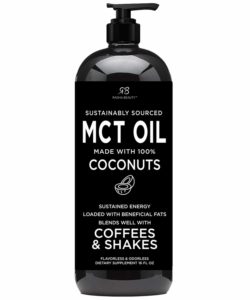
This MCT oil is made in the USA, Non-GMO, 100% natural and keto/low carb friendly.
There are no aftertastes but plenty of energy and appetite suppression in this dietary supplement. The bottle label mentions containing the full spectrum of MCT but the nutrition label lacks C12.
9. Island Fresh Organic MCT Oil
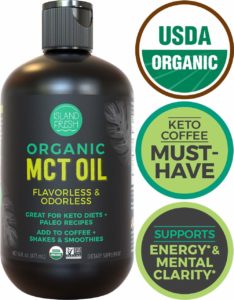
The Island Fresh MCT oil is perfectly blended to be added to your morning coffee or shake. This MCT oil has no odor or flavor and is simple to take or add to coffees, smoothies, and salads.
Bring the islands right into your kitchen, and experience how smoothly fresh and organic coconuts can boost your mood, focus, and energy levels. You will also notice fewer cravings throughout the day.
10. BUBS Natural MCT Oil Powder
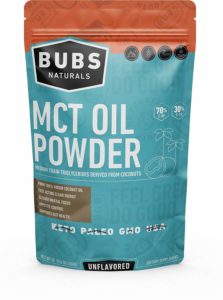
BUBS MCT oil powder was compounded to boost energy and mental focus while also suppressing appetite and improving your overall gut health. This powder has both C8 and C10 but does not contain C12.
It can easily mix into anything from coffee and smoothies to cooking or baking products. There is no foul flavor or odor and the powder is very gentle on your digestive system. This compound is from 100% sustainable sources and is Non-GMO, gluten-free, and dairy-free.
11. Intentionally Bare Pure C8 Organic MCT Oil
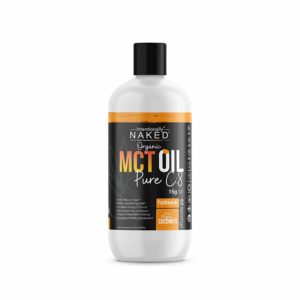
Intentionally Bare MCT Oil contains 99.2% C8 and only a fraction of a percent of C10 with 0% C12. This 32 oz. the bottle is full of brain-boosting goodness that improves focus and energy without additional additives.
This MCT oil is perfect for all of the diets including keto, paleo, or vegan. Additionally, you will find that this MCT oil is Non-GMO, gluten-free, dairy-free, and even made in the USA. This oil is odorless and only has a natural coconut flavor that is extremely light.
How We Rank
The first thing we looked at was the ingredients. Products that used MCT oil as an additional ingredient rather than a primary component were not given any consideration as their potency and purity would be questionable in terms of health benefits.
In choosing to focus on products that were designed purely for the delivery of MCT oil, we also chose to analyze the various types of MCT oil contained in each supplement. MCT oil products will contain either caprylic acid or capric acid. Products that contained “capra fatty acids,” like Bulletproof Brain Octane Oil and Team Keto Pure C8, were given higher priority than those that contained other forms of medium-chain triglycerides.
Products used for our rankings were required to have no additional fillers, additives, binders or unnecessary ingredients. As purity was the primary focus of our list, products that had additional oils such as the supplement provided by NOW Foods were excluded. This exclusion included flavors that were artificial or comprised of non-disclosed ingredients.
Next, we evaluated the product form. While there are several available forms of MCT oil, we chose products that were provided in either a liquid or powder form. When unprocessed, MCT oil will come in a liquid form at room temperature with a melting point between 30 and 50 degrees. Oil can be a bit messy for some people, so the powder form like BUBS, was given extra consideration. Powders make it easier to measure doses, but they do require the use of binders for stabilization purposes.
Finally, we chose products that had additional bonuses such as non-GMO certification or products developed from all-organic sources. Though these were not imperative for inclusion, these are always an added benefit when looking for a high-quality supplement. This is why you’ll see products like Viva Natural’s and Nuzena ranked so highly.
Benefits
1. MCT oil helps with weight loss. A 2015 study showed that an MCT rich diet (both natural and synthetic) resulted in more fat loss when compared to an LCT rich diet (4).
However, the effects seem to disappear after 14 to 21 days.
Two 2016 studies showed that MCTs helped to reduce calorie consumption and body fat while increasing energy expenditure and fat burning (5, 6).
The magic is that MCTs are broken down faster than LCTs making them more readily used by the body and less likely to be converted to and stored as fat (7).
A 2003 study compared the effects of diets rich in medium-chain triglycerides (MCTs) or long-chain triglycerides (LCTs) on body composition, energy expenditure, substrate oxidation, subjective appetite, and ad libitum energy intake in 24 overweight men.
It was found that the consumption of a diet rich in MCTs results in greater loss of AT compared with LCTs, perhaps due to increased energy expenditure and fat oxidation observed with MCT intake. Thus, MCTs may be considered as agents that aid in the prevention of obesity or potentially stimulate weight loss (8).
A 1996 study set out to determine the effect on body composition and 24-hour energy expenditure with low doses of MCT’s. This study suggests that relatively low-to-moderate intake of MCT (15-30 g per day) as part of habitual diet may play a role in the control of human body composition by enhancing daily energy expenditure, and that this effect is mediated at least in part through activation of the sympathetic nervous system (9).
2. MCT’s help increase the feeling of fullness. A 2014 study showed that both leptin and peptide YY (two hormones that promote the feeling of fullness in the body) was increased with supplementation of MCT oil (10).
A 2017 study found that MCT oil may even work better than nature’s own coconut oil. The study determined that when people took MCT oil, they consumed less food than those taking coconut oil (11).
3. MCT’s can fuel your brain. A 2014 study showed improvements in memory, brain processing and learn with MCT consumption (12).
Another 2015 study looked at coconut oil and MCT’s as a brain enhancer for Alzheimer’s patients. It was observed in subjects taking the product, a statistically significant increase in test score and therefore an improvement in cognitive status, improving especially women’s, those without diabetes mellitus type II, and severe patients (13).
Another 2015 study showed that MCT’s could improve memory compared to placebos in individuals with mild cognitive impairments (14).
4. MCT’s can lower cholesterol. A 2016 study involving obese individuals showed that MCT supplementation lowered LDL/HDL ratio, total, and HDL-cholesterol. It also improved the cardio-metabolic profile in obese individuals (15).
One 1978 study on Calves that consumed MCT-rich milk had lower cholesterol than calve that consumed LCT-rich milk (16).
A 2009 human study showed that natural MCT’s reduced LDL cholesterol and increased HDL cholesterol when compared to soybean oil when combined with a low-calorie diet (17).
However, the results have been mixed. Another 2004 study compared the effects of a diet rich in either MCT’s or oleic acid on fasting blood lipids, lipoproteins, glucose, insulin, and lipid transfer protein activities in healthy men. MCTs resulted in 12% higher LDL-cholesterol concentrations, 32% higher VLDL-cholesterol concentrations, a 12% higher ratio of LDL to HDL cholesterol, and 22% higher blood total triglyceride concentrations (18).
5. MCT’s can help manage diabetes. One study demonstrated that diets rich in MCTs increased insulin sensitivity in adults with type 2 diabetes. Specifically, 30% less sugar was needed to maintain normal serum sugar levels with the supplementation of MCT (19).
One small 2007 Chinese study of 40 people with diabetes found reductions in body weight, insulin resistance and waist circumference in the group who consumed MCT oil daily versus corn oil containing LCTs (20).
6. MCTs have been shown to be antifungal and antimicrobial (21, 22, 23). A 2007 study showed that MCTs could reduce a common yeast, Candida albicans, by 25% (24).
A 1999 study showed that MCT’s suppress the development of fungus in hospitals by up to 50% (25).
Another 2013 test-tube study published in the Journal of Medicinal Food demonstrated reduced growth of a disease-causing bacteria called Clostridium difficile, when MCT’s were used (26).
7. MCT’s may enhance exercise performance. MCTs may help reduce lactate buildup and thus help athletes push harder for longer.
A 2009 study out of Tokyo found that athletes who consumed about 1.5 teaspoons of LCT’s with food before cycling had higher lactate levels and found it harder to exercise, compared to those taking MCT’s (27).
Since MCT’s is used for energy quickly, it helps the body shift from a sugar-burning state to a fat-burning one. However, improving performance is still not 100% certified as a few studies found physical improvements in mice but none in humans (28, 29, 30).
However, studies show that it doesn’t hurt performance which is always a good first step in the right direction (31).
8. MCT’s can help treat Alzheimer’s. A 2004 study showed that MCT’s were able to improve cognition in 20 patients with Alzheimer’s (32).
However, all subjects had a specific gene type, so it’s uncertain if it was just the MCT’s working or something else.
A 2016 study showed an improvement in symptoms of mild-to-moderate Alzheimer’s when patients supplemented with 20–70 grams of MCTs (33).
9. MCT’s can help treat autism in children (34). One 2018 study found substantially improved autism behaviors in children when a ketogenic and gluten-free diet was mixed with MCT’s (35).
However, we must remember that autism can affect children in many different ways since it is a spectrum condition. This means that adding MCT oil to your child’s diet may help to varrying degrees or may show no positive effects. More research is needed here, as well (36).
10. MCT’s can help treat epilepsy. One test-tube study showed that the MCT capric acid improved seizure control better than a widespread anti-epileptic drug (37).
Another study in rats found that the same MCT blocked receptors in the brain that cause seizures, though more human studies are needed (38).
11. MCT’s can help with fat malabsorption. Due to the short chains of MCT’s, they can bypass a lot of the digestive processes required and provide nutrition for the body much easier and faster – especially in scenarios where digestion might be compromised (39).
12. MCTs may help balance the gut microbiome. In turn, it may help in numerous digestive diseases, such as celiac disease, liver issues, diarrhea, and other digestive problems. Further, a 2016 study suggested that MCTs may help in metabolic processes by balancing out the gut microbiome (40).
13. MCTs may be used as a therapeutic component in treating Alzheimer’s Disease. A 2008 study indicated that MCTs involved in producing ketosis helped improve cognitive functioning in those patients with mild to moderate Alzheimer’s Disease symptoms (41).
14. MCTs may aid in treating chylothorax, a rare lung disease.
Researchers explored this relationship in a 2010 study. In the study, 24 patients with chylothorax were put on an MCT diet. 17 patients were considered successful. In other words, the MCT diet proved useful in 71% of patients with chylothorax (42).
15. An MCT diet may help control seizures in children. In a 2012 study, researchers explored an MCT diet in relation to seizures in children. The results showed that an MCT diet promoting ketogenesis was actually more effective than the established epilepsy treatment called Valproate or VPA. It further highlighted how this method had reduced side effects when compared to current and existent treatment strategies (43).
Another study presented a case involving a 43-year-old man with epilepsy. He was instructed by researchers to take 4 tablespoons of MCT oil daily. His seizures were decreased from numerous seizures every day to 1 seizure approximately every 4 days. Researchers suggested that MCT may prove to be a viable treatment method for not just children with epilepsy, but also adults (44).
A 2009 study also had similar results. Again, an MCT ketogenic diet was credited for reducing seizure incidences in children (45).
16. MCT Oil is a healthy source of fat. Your body needs fat to survive for brain function and energy. The problem is many diets teach you to reduce fat intake or even cut it from your diet. MCT oil is a healthy way to get much-needed fat into your body.
MCT oil is a medium-chain triglyceride, which literally makes it a medium-chain fat. The most common fats that people consume are long-chain. There are also short-chain fats. MCT oil is the happy medium between these fatty acid types and provides your body with an essential nutrient for optimum function.
Why MCT oil works as a fat and a brain or energy booster is because it provides fat to the body that is immediately used and the benefits are reaped right away. Since the elements are used immediately, there are no fat stores developed from MCT oil consumption.
17. MCT supplementation could be more effective during a ketogenic diet. Raising the ketone blood levels is the goal of anyone participating in a ketogenic diet. If you’re looking at speeding up the process of entering ketosis, adding coconut oil to your diet could be very beneficial.
Ketogenic diet practitioners all rave about coconut oil and its ability to help you enter ketosis easily, plus the many other supposed benefits. It appears that if you were to use ketosis for short term fat loss, the brief increase in metabolism that coconut oil displayed in this 1999 study might be beneficial (46).
More studies on humans are needed, but the research to date appears promising.
Side Effects
1. MCT’s can cause IBS like symptoms. Many people when they take too much MCT at once when first starting out seem to find it upsets the stomach and intestines causing cramping and diarrhea.
2. MCT’s can increase your appetite. A 2017 study found that MCTs increased the release of two hormones that stimulate appetite, ghrelin and neuropeptide Y, in people with anorexia (47).
However, it is unclear whether the increase in these hormones actually causes you to eat more.
3. MCT’s may cause fat buildup in the liver. A 2017 study on mice showed that when 50% of dietary fat was MCT, the liver became fattier. That being said, MCT’s improved insulin resistance and overall body fat (48).
4. MCT may cause heart palpitations. When consumed with higher doses of vitamin D, MCT oil may cause heart palpitations in certain individuals. Vitamin D increase calcium in the blood (49).
Since Vitamin D is fat-soluble, MCT oil will up-regulate the absorption process, leading to more calcium in the blood, which can cause heart palpitations. If you are taking high doses of vitamin D, it’s important to take Vitamin K2 as well, to mitigate this issue.
5. MCT oil can raise LDL (bad) cholesterol. Studies show that the variability in response to a diet high in saturated fat (MCT oil) is tremendous (50).
As such, in certain individuals that are hyper-responders, MCT oil may increase bad cholesterol.
Recommended Dosage
Currently, it’s advised to start at 1 teaspoon and gradually work your way up to the normal 1-3 tablespoons per day. However, there is currently no upper limit too much one can consume.
Also, there are currently no reported adverse interactions with medications or other serious side effects.
FAQ
What does MCT mean? Medium-chain triglyceride (MCT) a glycerine ester combined with medium-chain triglycerides distinguished from other triglycerides by having 8 to 10 carbon atoms. Once hydrolyzed, these fatty acids can be absorbed directly into the portal system.
What are the side effects of MCT oil? They can cause diarrhea, vomiting, irritability, nausea, stomach discomfort, intestinal gas, essential fatty acid deficiency, and other side effects. Taking MCTs with food might reduce some side effects.
How do you take MCT? MCTs are safe for most people when taken by mouth or given intravenously (by IV). They are usually mixed into coffee, smoothies, salad dressings or used to cook and fry foods.
Is coconut oil and MCT oil the same? No, the main difference between MCT oil and coconut oil is their MCT content. Coconut oil is 55% MCTs, while MCT oil is made 100% of MCTs.
How much MCT oil should I take for weight loss? You can stay at 1 tablespoon for 1-2 weeks before attempting to increase up to 2 tablespoons per day which is the ideal dose. Most of the benefits of MCT oil will be realized at this 2 tablespoon dosage (including weight loss, cognition, gut health, etc.).
Is MCT oil bad for cholesterol? Studies show saturated fat raises LDL (your so-called “bad” cholesterol), but it improves the quality of the LDL and increases its size making it less likely to promote heart disease. It also raises HDL (“good” cholesterol).
What are the best natural sources of MCT oil? Coconut oil, palm kernel oil and dairy products are all good natural sources of MCT oils, with coconut oil being the best.
How does MCT oil help you lose weight? Consider MCT oil as a super fuel for your cells, because it boosts fat burning and increases mental clarity. MCT can also help you lose weight because it is quickly burned and metabolized.
Can an MCT diet help control seizures? Research indicates yes. An MCT diet promotes ketosis which has shown to significantly reduce seizure episodes – specifically in those suffering from epileptic seizures.
Is MCT powder or oil better? Both the liquid and powder forms of MCTs are a great source of clean and sustainable energy. However, the oil is almost always higher quality and more expensive. Thus if you can afford it, get the oil.
Is it acceptable to take MCT oil at night time? It is recommended that you take MCT oil in the morning or early in the day, as it is a known energy booster. If you take MCT oil at night you might find yourself feeling restless or full of energy when you want to be sleeping. Taking MCT oil at an appropriate time of day might actually help you sleep better because you are providing your body energy and nutrients when it needs them the most and allowing your body to reach relaxation at night time as well.
Can you take too much MCT oil? MCT oil is a great product, in the proper amounts. If you take too much you might experience digestive issues that will leave you exhausted and uncomfortable. The recommended serving size is typically the maximum MCT dosage you should need for a full day.
When you are new to MCT oil, you should start with a fraction of that recommendation and work your way up. We recommend that if you exceed that serving size that you make it a rare circumstance to avoid harmful side effects.
Is MCT oil safe for use during pregnancy? While considered to be generally safe, MCT oil is not recommended for use in pregnant and lactating women. Though there have been no concrete studies showing detrimental effects while using this supplement, the benefits and side effects are largely unknown. To ensure the best outcome, it is recommended that pregnant women avoid this supplement. In the event a pregnant woman is considering using this supplement, it is important to first consult a trained physician.
Can children take MCT oil? Yes, children can partake in MCT oil supplementation in certain cases. Though not generally prescribed for children, MCT oil has been shown to have positive benefits for multiple conditions often diagnosed or experienced during childhood. Clinical studies involving children with Autism have demonstrated success in using MCT oil to modify or lessen behaviors often seen in autistic children. While this is the case, however, parents should consult a pediatrician prior to beginning this treatment regimen.
Can MCT oils cause issues for those who have diabetes? Yes, MCT oil is safe for those diagnosed with diabetes. Through scientific research and data, MCT oil has been shown to have a positive impact on those attempting to manage their diabetic symptoms. As body weight, insulin resistance, and blood sugar levels are primary concerns when controlling diabetes, studies around these areas have been substantial. Several studies have shown MCT oils to be highly successful in the management of blood sugar levels and maintaining fat. Those considering MCT oils as a solution for their diabetic needs should consult their physician prior to doing so.
Are there food sources of MCT oil? Yes, while there are multiple supplements available for the consumption of MCT oil, there are also several ways to consume MCT oil through food directly. MCT oil can be consumed directly through certain types of milk, coconut oil, palm kernel oil, and butter. As with any supplement, it is important to review and research the best sources of MCT oil to ensure desired health benefits are achieved successfully.
Is MCT Oil better than coconut oil? One if not necessarily better than the other; they are simply different. MCT oil (which stands for medium-chain triglyceride) is a fatty acid composed of a 6-to-12 carbon chain. MCTs are often found in coconut oil (which contains both MCTs and other types of fatty acids) but can also stand alone.
What is the difference between coconut oil and MCT oil? MCT oil can actually be derived from coconut, but it is a much more concentrated compound when compared to coconut oil. MCT oil contains 100% MCTs, whereas coconut oil only contains about 45% – 65% MCTs.
Why is MCT a unique fat? MCT oil’s unique absorption means that it is more likely to be used as energy and less likely to be stored as body fat, compared to long-chain fats.
Why does MCT oil hurt my stomach? MCT oil can cause significant gastrointestinal distress, such as diarrhea, vomiting, bloating and cramping, because it is metabolized differently than other long-chain triglycerides.
Is MCT oil keto-friendly? Yes, MCT oil is keto-friendly.
Recap
Medium-chain triglycerides have many potential health benefits. While they are not a ticket to dramatic weight loss, they may provide a modest benefit. The same can be said for their role in endurance exercise. MCTs are also a great source of energy, protect the heart and brain from disease and even fight bacterial growth.
MCTs can often cause an upset stomach, especially for new users. As long as it’s tapered up then you shouldn’t have an issue with this. It can also cause weight gain if it simply adds to your daily fat intake instead of replacing it.
As per any supplementation or addition to your diet, consider checking with your family doctor before consumption. They know you and your specific health history which means they will be better suited to determine if MCTs are right for you.
For Healthtrends #1 MCT Oil recommendation, click here.
